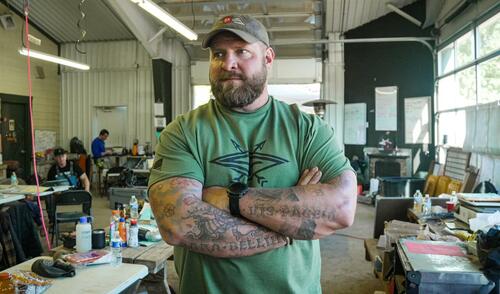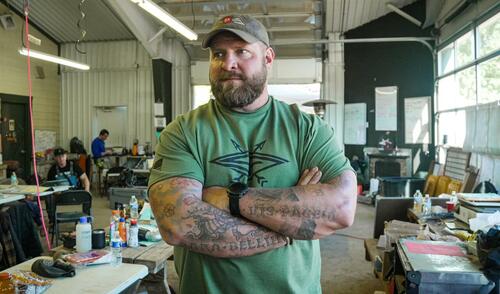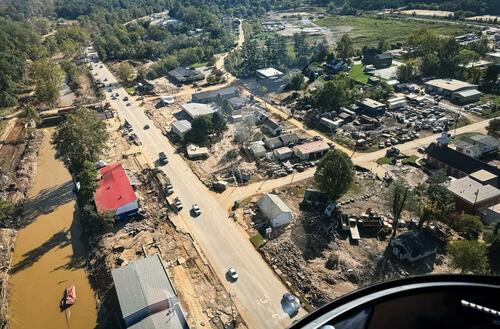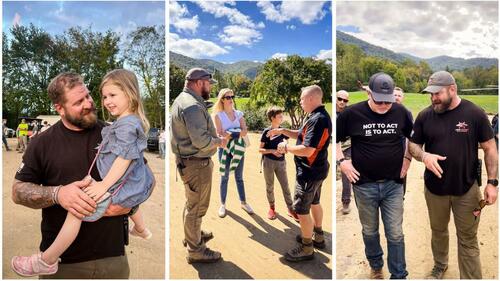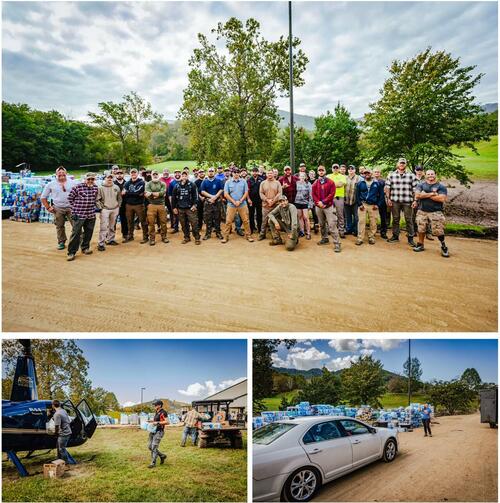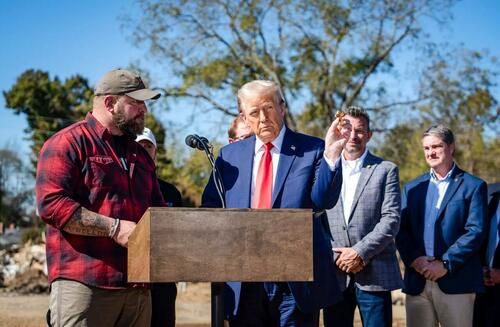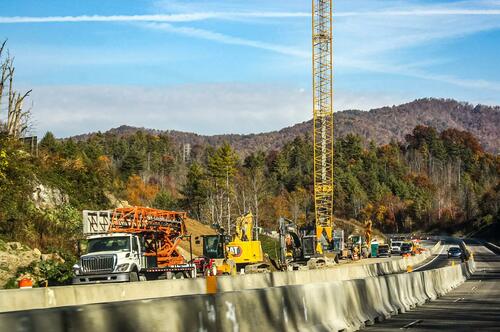Meet Adam Smith, The Green Beret Behind North Carolina’s ‘Redneck Air Force’
Authored by Samantha Flom via The Epoch Times,
“They’re probably dead.”
That was the thought running through Adam Smith’s mind as he raced to find a way to save his 3-year-old daughter and her mother from the devastation wrought by Hurricane Helene.
Smith, a former U.S. Army Green Beret, spent 17 years conducting military operations around the globe in defense of his country.
He never expected to need those skills to save his family.
“I don’t think anything can prepare you for the thought of losing your child,” Smith told The Epoch Times on Oct. 26, exactly one month after Helene touched down as a Category 4 hurricane in Florida and barreled on toward the unsuspecting mountain communities of western North Carolina.
“Nobody really, truly understands the devastation that’s happened on the ground until you come and drive and see it,” Smith said.
“There are towns that are literally gone, swept off the face of the earth.”
Helene claimed at least 102 lives in the Tar Heel State, including 43 in Buncombe County. In the hard-hit community of Swannanoa, clouds of dust still hover in the air as teams of volunteers work to clear the piles of debris.
Traveling through town on Highway 70, the wreckage from collapsed homes, businesses, and bridges paints an apocalyptic scene. But spray-painted among the ruins are messages of hope, strength, and endurance that speak to the resilience of the people who call this area home.
Smith knows something of resilience, having seen it in his daughter, ex-wife, and countless others he has helped through Savage Freedoms Relief Operations, an initiative he launched to assist those affected by Helene. And with the long road to recovery still ahead, that strength will be needed to ensure North Carolina’s hurting communities aren’t forgotten.
An aerial view of the hurricane-battered community in Swannanoa, N.C., in this undated photo. Courtesy of Adam Smith
The Catalyst
At the Harley-Davidson dealership in Swannanoa, helicopters and military vehicles laden with supplies come and go.
The spot has become an operations center for Smith and his team as they conduct their relief missions.
The parking lot, once home to an array of motorcycles, is now a base camp lined with the trucks and tents of volunteers from across the country who have settled in for the long haul.
Smith glanced in the passenger side mirror of the van he and his fiancée, Taylor Knipp, converted into a makeshift home. He joked that he needed a shave, but the laughter soon faded from his eyes as he reflected on one of the most terrifying events of his life.
“This whole thing just happened organically. I mean, really, it happened from a selfish desire to save my daughter,” Smith said.
He and Knipp were driving home from Texas late on Sept. 26—the day Hurricane Helene made landfall—when he lost contact with his daughter and her mother. When he still couldn’t reach them the next morning, he began to worry.
Adam Smith, along with his family and teammates, launched the Savage Freedoms Relief Operations, an initiative to assist those affected by Hurricane Helene. Courtesy of Adam Smith
“Nothing was going through, and so we made the decision right then that we were just going to hammer down and get back here as fast as we could,” he said.
When they finally arrived back in town, there was no way to get through. Interstate 40 was still flooded near the eastern Tennessee border, blocking the way up the mountain to where Smith’s daughter and ex-wife lived, just next door to the cabin he and Knipp shared.
When the water eventually receded, entire sections of the highway were gone, trapping those on the mountain without food, clean water, or other resources.
With the cell towers down and the power out, Smith had no way of reaching his family. Occasionally, though, messages from his former brother-in-law managed to break through.
“I’m not really sure how he could get them out, so I just have to assume that it was God’s plan to make certain that we knew what was going on,” Smith said.
“But the text messages we got from him were, ‘We tried for eight hours, we can’t get in. We haven’t heard from them. We don’t know how they are.’”
Unable to drive through, Smith was forced to find alternative transportation. He drove to Greenville, South Carolina, to find cell service, and from there he was able to connect with a helicopter pilot who agreed to fly him up the mountain.
They took off from the field next to the Harley-Davidson—the only place Smith knew of that could accommodate a helicopter.
“We flew in and landed, and my daughter and her mom came walking around from a hedgerow of trees. And my little girl was wearing a little flower dress, barefoot, running up, and she’s going, ‘Daddy, Daddy, why did you ride in a plane?’” he laughed, eyes welling with tears.
“Seeing her, that was really the catalyst that set all of this in motion.”
Disaster Response
Within days of that first rescue mission, Savage Freedoms Relief Operations was born as an offshoot of Smith’s self-defense training company, Savage Freedoms Defense.
“We had special operations volunteers and veterans show up that just came out of the woodwork,” Smith said, noting that people driving by would see them and pull into the Harley-Davidson parking lot.
By Wednesday of the first week, more than 70 volunteers had gathered there to contribute in whatever way they could.
“There was no ego. There was nobody trying to be in charge. There was no one trying to take credit,” Smith said.
“And it just grew into that. It just happened naturally.”
Inside the dealership, Smith’s team built a command center through which they could view requests for assistance and dispatch resources as needed.
In those first few days after the storm, the group became known locally as the “Redneck Air Force” as they searched for trapped survivors in the mountains. But Smith was quick to point out that there were others helping too, including other humanitarian organizations, first responders, and the National Guard.
“The National Guard started flying helicopters on Saturday afternoon. We didn’t get direct contact with them, I think, until Tuesday or Wednesday morning, but they were on the ground doing work,” he said.
Adam Smith transformed the parking lot of a Harley-Davidson motorcycle dealership into a makeshift air base to help distribute supplies after Hurricane Helene struck the Asheville, N.C. area. Courtesy of Adam Smith
The Federal Emergency Management Agency (FEMA) also deployed 1,200 search and rescue personnel, though Smith said he didn’t see any of the agency’s vehicles on the ground “until 10 days or 11 days in.”
He noted that FEMA did arrive at the Harley-Davidson with a supply drop about two weeks after the storm. But by that point, civilian volunteers had already collected and distributed “hundreds of thousands of supplies.”
FEMA faced backlash over its response to Hurricane Helene as rumors spread that the agency was hindering civilian rescue and recovery efforts. FEMA denied those claims.
Smith, however, has his own qualms with the agency.
“The fact of the matter is that FEMA operates exactly as it’s designed to operate. It’s a slow-moving, bureaucratic, weighty process with too much red tape,” he said.
That red tape often results in the slow-walking or outright denial of applications for support or assistance, Smith said, describing the agency as ineffective and inefficient.
With President-elect Donald Trump preparing to take the reins, Smith said he hopes that the new administration will address some of those concerns. He also stressed that the solution should include ensuring that future disasters do not become political pawns.
“The political infighting has to stop when it comes to how much political capital can we suck out of this disaster,” he said.
Smith noted that when President Joe Biden and Vice President Kamala Harris first visited North Carolina in the days following the storm, the Secret Service’s airspace restrictions brought most civilian rescue and recovery efforts to a halt.
“We contacted Secret Service … to get discreet squawk codes to continue to fly. Even then, we were shut down for two hours during the eight-hour window,” he said.
“I don’t know what definitive impact that had on the people of western North Carolina, but I do know the overall impact was felt and there was frustration.”
Democratic presidential nominee Vice President Kamala Harris walks with members of the U.S. Armed Forces and North Carolina Gov. Roy Cooper (L) after being briefed on recovery operations in the aftermath of Hurricane Helene, at the the Charlotte Air National Guard Base in Charlotte, N.C., on Oct. 5, 2024. Mario Tama/Getty Images
A Perspective Shift
Trump visited Swannanoa weeks later, on Oct. 21, to survey the damage wrought by Helene and hold a press conference.
During his visit, Trump commended Smith for his “amazing act of citizenship and service” in helping others in need.
Smith, in turn, thanked the 45th president for delaying his trip so as not to hinder relief efforts. He also handed him a gift: a small wooden cross.
Reflecting on that moment, Smith said his Christian faith, far from shaken, had been bolstered in the storm’s aftermath.
“I have seen more profound miracles in the last four weeks than I’ve ever seen in my entire life,” he said.
He recounted instances where desperately needed medical supplies had arrived within minutes, and others where those experiencing medical emergencies on the mountain were rescued just in time.
“There have been conversations with people where children were saved after their families had been swept away, and they found these babies either on a rooftop or in a top floor,” he said.
“And I’ve also had more conversations than I think I’ve ever had before with people showing up and saying, ‘This has changed my life. And I didn’t realize this, but I found God here.’”
Describing the post-Helene whirlwind as “the most emotional experience” of his life, Smith said the storm’s impacts went deeper than the devastation still visible on every street corner.
“I think the perspective shift and change for people on the ground here, specifically, has been so profound and so impactful that, obviously, this area will never be the same,” he said.
“And I also think that this area will have a higher population of those who found God than maybe anywhere else in the country in the next decade.”
Adam Smith (L), founder of Savage Freedoms, speaks with Republican presidential candidate former President Donald Trump during his visit after Hurricane Helene, in Asheville, N.C., on Oct. 21, 2024. Madalina Vasiliu/The Epoch Times
For Smith, that shift in perspective gave him the resolve to propose to Knipp.
“I sort of had a moment of self-reflection, and everything that we were doing was dangerous,” he said.
“There’s so much loss of life, and the fear of losing my daughter and her mom, and I thought, you know, [expletive] it. I’m not going to wait anymore. Time is precious.”
He caught his entire crew by surprise when he pulled the ring out of his backpack during one of their nightly briefings.
It wasn’t the dramatic proposal Smith had envisioned, but that fact seemed trivial compared to the crisis their community was facing.
The Recovery
Although their rescue operations have long since ceased, Savage Freedoms Relief Operations continues to provide supplies and assistance to those in need.
The organization is also helping to rebuild residents’ homes, and with the winter months fast approaching, housing is the top priority.
Smith said he believes there is enough temporary housing available, but the reconstruction phase of the recovery will pose its own challenges.
“There’s going to be a rezoning of floodways and flood plains after this event, and there’s going to have to be a study done at multiple levels to identify what that rezoning looks like,” he noted.
“How long is that going to take? … How is that going to affect their ability to rebuild?”
Construction workers repair a portion of Interstate 40 that was damaged by Hurricane Helene near Asheville, N.C., on Oct. 26, 2024. Samantha Flom/The Epoch Times
Smith said they could start rebuilding now and “ask for forgiveness, not permission,” but there would likely be legal repercussions, and securing federal funding takes time.
He suggested that bridging the gap between private sector efforts and public funding could be the quickest solution.
“If I can take a private donor and funnel their money through a 501(c)(3), so there’s a tax deduction opportunity for them, and then we can … put it straight to the family in need, that’s the way we can bridge this gap,” he said.
Most of all, however, Smith said it is crucial that the people of western North Carolina are not forgotten as they continue to pick up the pieces.
“There has to be a maintained awareness for what’s happening here,” Smith said. “We can’t let the message die, and we can’t let the national attention continue to drift somewhere else when the reconstruction, rebuilding effort of western North Carolina is going to take years and billions of dollars.”
Tyler Durden
Mon, 11/18/2024 – 20:05

